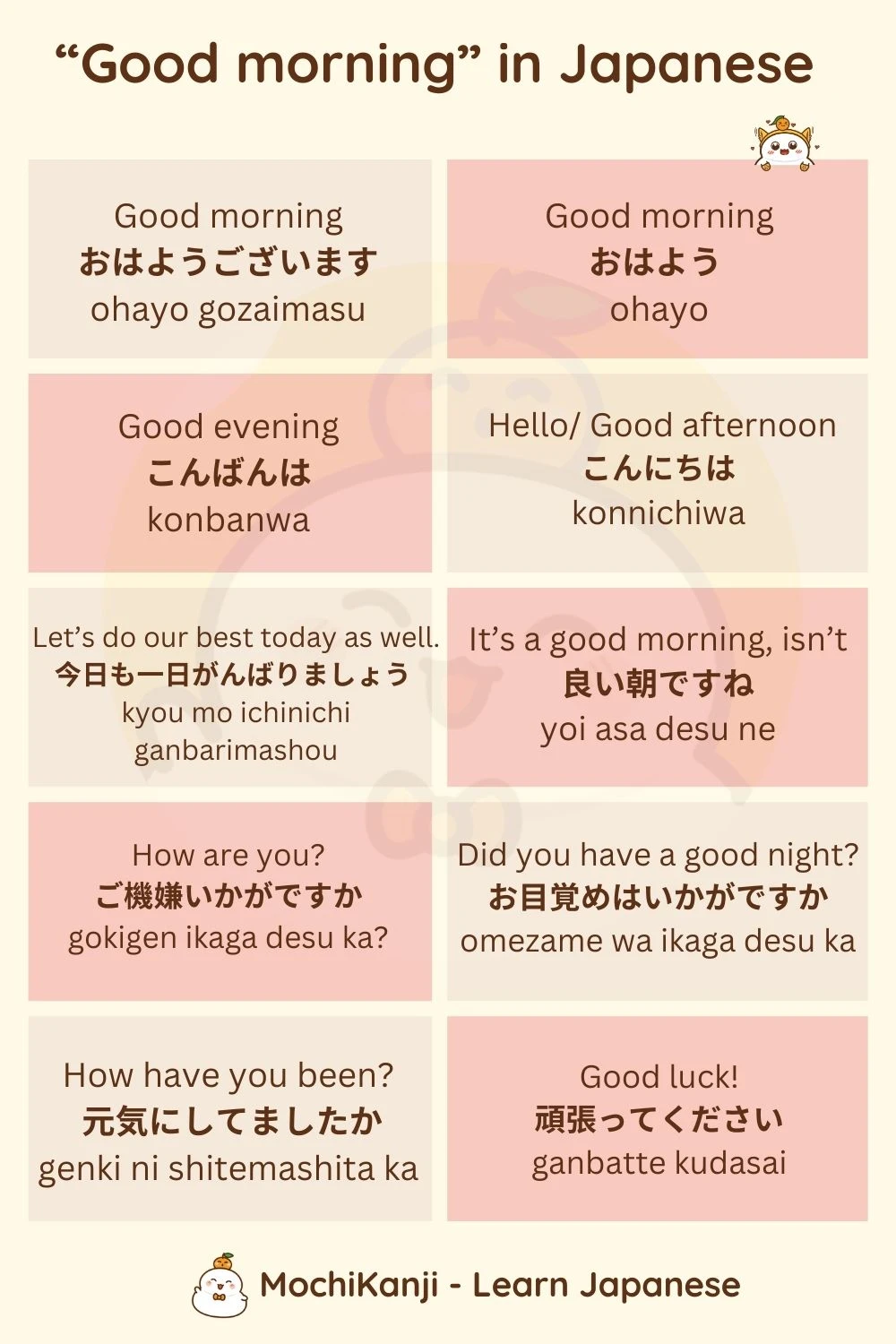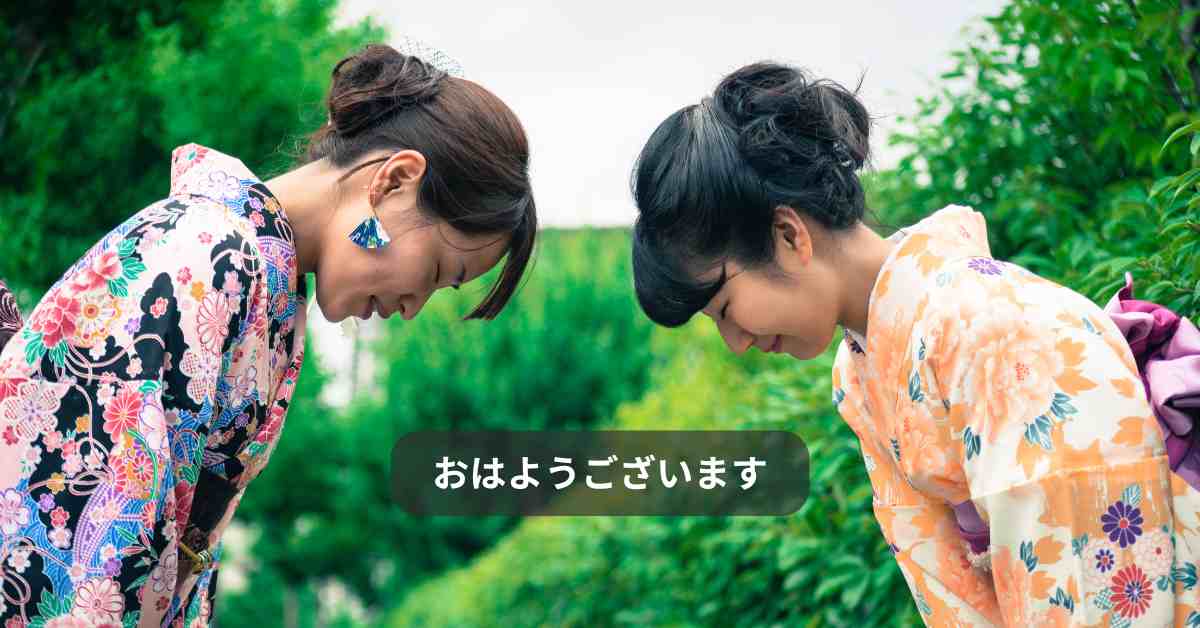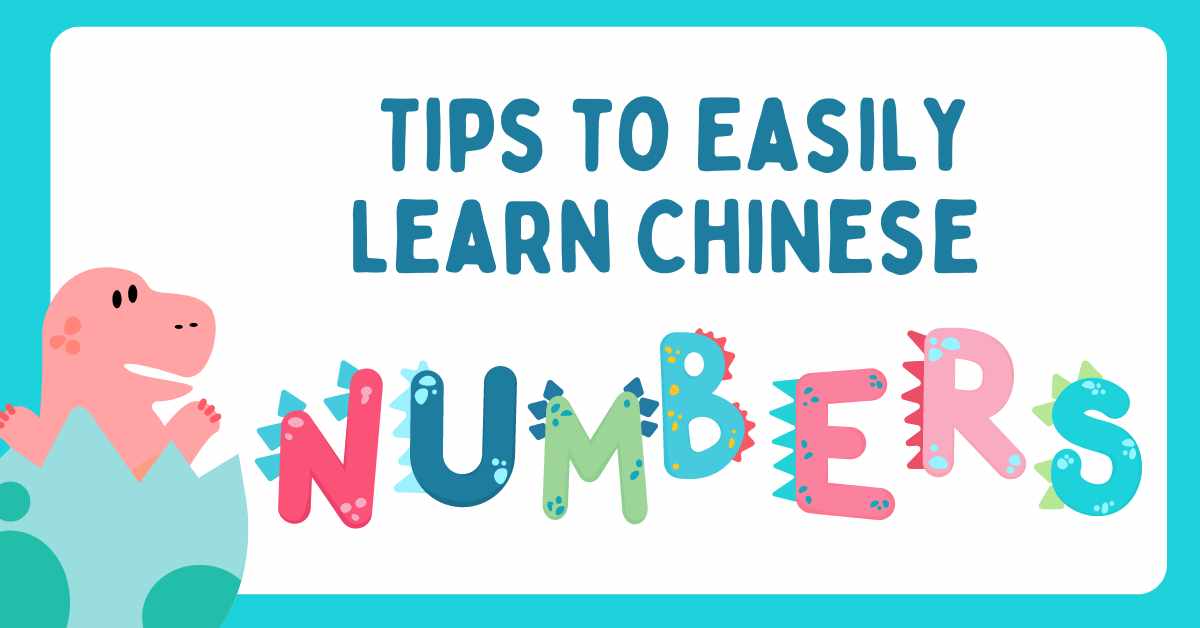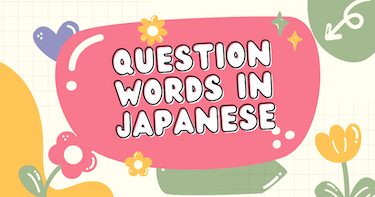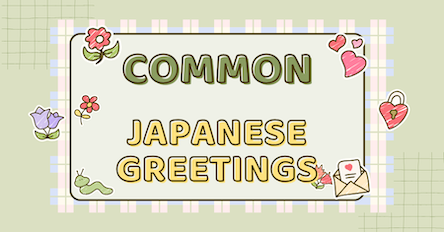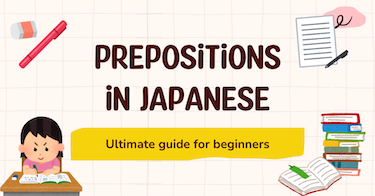How to say “Good morning” in Japanese: Greetings for every occasion
Good morning! Or, as they say in Japan, “おはようございます” (Ohayou gozaimasu). Greeting someone in the morning can be more than just a simple hello; it’s a way to express respect, and friendliness, and to start the day on a positive note.
In this article, you will learn 10 popular Japanese greetings, ranging from the proper way to say good morning to introducing yourself correctly. We will also share essential advice on how to use these greetings correctly and effectively.
- 10 popular Japanese greetings
- Using the correct gestures for “Good morning” in Japanese
- Understanding context and nuance
- Tips for learning Japanese conversation effectively
- FAQs

1. おはようございます – Ohayo gozaimasu
- Meaning: Good morning
- Romaji: Ohayo gozaimasu
The most common and widely accepted way to say good morning in Japanese is “おはようございます”. This phrase is polite and formal enough to be used in almost all situations. Whether you’re speaking to your boss, a colleague, or a stranger on the street, this greeting is appropriate and shows a level of respect.
2. おはよう – Ohayo
- Meaning: Good morning
- Romaji: Ohayo
For a less formal situation, such as greeting friends or family, you can drop the “ございます” and simply say “おはよう”. This is equivalent to saying “morning!” in English. It’s friendly and casual.
3. こんばんは – Konbanwa
- Meaning: Good evening
- Romaji: Konbanwa
This is the standard greeting for “good evening” in Japanese, suitable for any evening occasion.
4. こんにちは – Konnichiwa
- Meaning: Hello/ Good afternoon
- Romaji: Konnichiwa
When meeting someone for the first time during the day, “Konnichiwa” is a suitable greeting. It sets a polite and neutral tone for the conversation. This phrase is traditionally used during the daytime, from around noon until the late afternoon (roughly 10 AM to 5 PM). It’s a versatile greeting that can be used regardless of whether it’s a workday or weekend.
5. 今日も一日がんばりましょう – Kyou mo ichinichi ganbarimashou
- Meaning: Let’s do our best today as well.
- Romaji: Kyou mo ichinichi ganbarimashou
This phrase means “Let’s do our best today as well.” It’s a great way to motivate and encourage your team or colleagues in the morning, fostering a sense of camaraderie and shared purpose.
6. 良い朝ですね – Yoi asa desu ne
- Meaning: It’s a good morning, isn’t it?
- Romaji: Yoi asa desu ne
Translating to “It’s a good morning, isn’t it?” this greeting is perfect for days when the weather is nice, or when you’re simply in a good mood and want to spread some positivity.
7. ご機嫌いかがですか – Gokigen ikaga desu ka
- Meaning: How are you?
- Romaji: Gokigen ikaga desu ka
This means “How are you?” in a very polite and formal manner. It’s suitable when you want to show concern and politeness, especially in a professional setting.
8. お目覚めはいかがですか – Omezame wa ikaga desu ka
- Meaning: Did you have a good night?
- Romaji: Omezame wa ikaga desu ka
This phrase means “Did you have a good night?” and is a considerate way to greet someone, typically in a family or close friends setting, especially if you know they had a rough night or are not morning persons.
9. 元気にしてましたか – Genki ni shitemashita ka
- Meaning: How have you been?
- Romaji: Genki ni shitemashita ka
Asking if someone has been energetic or well recently, this greeting is casual and friendly, suitable for friends and acquaintances you haven’t seen in a while.
10. 頑張ってください – Ganbatte kudasai
- Meaning: Good luck!
- Romaji: Ganbatte kudasai
This means “Please do your best” or “Good luck”, and used to give someone motivation to try their best despite difficult challenges.
To learn how to say “good morning” in Japan, MochiKanji’s conversation course is the perfect solution. MochiKanji effectively enhances your Japanese speaking skills, including mastering phrases like “good morning in Japanese.” The program offers interactive lessons and real-life scenarios, helping you confidently communicate confidently.
Using the correct gestures for “Good morning” in Japanese
Casual gestures:
When greeting casually, especially among friends or family, you can accompany “おはよう” (Ohayou) with a simple wave or a slight nod of the head. This gesture is relaxed and conveys a friendly, informal tone.
Formal gestures:
In formal settings, such as business or with elders, “おはようございます” (Ohayou gozaimasu) is used. Accompany this with a bow. The depth of the bow indicates the level of respect: a slight bow for regular greetings and a deeper bow for showing higher respect or gratitude. Ensure to maintain eye contact briefly before bowing.
Understanding context and nuance
In Japanese culture, the level of formality in your greeting can reflect not only your respect for the person you’re speaking to but also your understanding of the social context and hierarchy. This makes choosing the right greeting not just a linguistic choice but a cultural one as well.
As you start to use these greetings, pay attention to the responses you receive. This feedback is invaluable as you learn the subtleties of Japanese language and culture.
Remember, every good day starts with a good morning. So, the next time you have the opportunity, try one of these greetings to warmly acknowledge the start of a new day. Download this image to learn 10 popular ways to say “Good morining” in Japanese.
Tips for learning Japanese conversation effectively
Want to learn how to speak and talk like a native speaker? Here are some effective tips, to enhance your Japanese conversational skills:
- Practice regularly: Consistent practice is key. Engage in daily conversations, even if it’s just a few sentences.
- Immerse yourself: Surround yourself with Japanese media such as movies, TV shows, and music. This helps in understanding context and improving listening skills.
- Use language exchange partners: Find a language exchange partner to practice speaking and listening.
Learn vocabulary with MochiKanji: Check out the MochiKanji-Learn Japanese app! The app uses a cool technique called Spaced Repetition System (SRS) to help you remember and retain vocabulary more efficiently. Basically, the technique makes sure you review words right before you’re about to forget them, making it way easier to remember them long-term. Moreover, MochiKanji also offers various conversational learning courses where you can learn using phrases like おはようございます.
By incorporating these practices, you can steadily improve your conversational abilities in Japanese. Good luck, or as you now know, “頑張ってください”!
FAQs
What is ohayo gozaimasu?
“Ohayo gozaimasu” (おはようございます) is the formal way to say “good morning” in Japanese. It’s used in polite or formal settings, especially when speaking to someone senior, such as a boss or teacher.
How do you say “good morning” in Japanese?
To say “good morning” in Japanese, you can use “おはよう” (Ohayou) for informal situations, or “おはようございます” (Ohayo gozaimasu) when you want to be more formal.
Is it Ohaiyo or Ohayō?
The correct spelling is “Ohayō” (おはよう) with a long “ō” sound. In romanization, the “ō” represents a long vowel, which is important in Japanese pronunciation. “Ohaiyo” is a common misspelling.
Is it konnichiwa or ohayo?
“Konnichiwa” (こんにちは) means “hello” or “good afternoon,” and is used later in the day. “Ohayo” (おはよう) is used specifically in the morning to say “good morning.” Both are greetings, but they are used at different times of the day.

